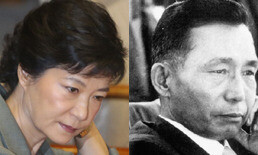hankyoreh
Links to other country sites 다른 나라 사이트 링크
At United Nations, Pres. Park pushes nostalgia for dictatorship

President Park Geun-hye made a concerted effort to whitewash the legacy of her father, former President Park Chung-hee, during a recent visit to New York to attend the seventieth United Nations General Assembly and UN Sustainable Development Summit.
In addition to actively promoting South Korea’s seventies-era Saemaul Movement for farming community development to developing countries, Park also praised her father as a “national leader founded in trust.”
Park related her own experiences with the movement while attending a special “senior-level Saemaul Movement event” in New York on Sept. 26.
“Seeing my father the President pursuing the Saemaul Movement, I was able to experience first-hand how the factors of success create a positive feedback loop that changes countries and their people,” Park said during the event.
She later mentioned “the leadership of a national leader founded in trust” as one of the factors of success.
Park described her father as having “allowed the people to trust in their government by thoroughly eliminating corruption among officials, while dedicating himself to creating a country where both cities and farming villages could prosper through a pure passion that did not pander to political popularity.”
Park also stressed the importance of “government leadership” as a factor in South Korea’s economic transformation during a mutual dialogue for the Sustainable Development Summit on Sept. 27.
“South Korea has the experience of escaping utter poverty and achieving both industrialization and democracy in the course of a single generation,” she explained.
“A guiding role for the state is crucial in building systems that are effective and trustworthy, and that rule is especially important during the early stages of economic growth,” she added - in what can be interpreted as a legitimization of developmental dictatorship tactics.
But analysts have historically charged that the Saemaul Movement was influenced from the outside by the political goal of mobilizing support from the farming population for the Yushin system, while its adoption was characterized by typical development dictatorship tactics of national mobilization through repressive government-led controls and commands rather than incentivizing volunteering. Park herself has described the Saemaul Movement in the past as the “practice that embodied the Yushin philosophy of October [1972].”
Questions have also been raised about the applicability of the movement’s methods - in which the government spearheaded an effort focused on efficiency and quantitative benchmarks - to modern market economies that are more focused on quality of life and lifestyle values.
For Park, who experienced the rapid growth of the 1970s serving as First Lady alongside her father Park Chung-hee (Park‘s mother was killed in an assassination attempt on her father in 1974) while the campaign was being implemented full-scale, the movement may have become a focus of her own convictions, as well as topic of potential political value.
“You could see this as a follow-up to her targeting of younger voters with a focus on jobs for younger people and addressing troop needs ahead of next year’s general election, only this time she’s trying to rally her [senior citizen] supporters with a ‘Park Chung-hee nostalgia’ strategy,” said Lee Cheol-hee, director of the Dumun Political Strategy Institute.
By Choi Hye-jung, staff reporter
Please direct questions or comments to [english@hani.co.kr]

Editorial・opinion
![[Guest essay] The real reason Korea’s new right wants to dub Rhee a founding father [Guest essay] The real reason Korea’s new right wants to dub Rhee a founding father](https://flexible.img.hani.co.kr/flexible/normal/500/300/imgdb/original/2024/0423/8317138574257878.jpg) [Guest essay] The real reason Korea’s new right wants to dub Rhee a founding father
[Guest essay] The real reason Korea’s new right wants to dub Rhee a founding father![[Column] ‘Choson’: Is it time we start referring to N. Korea in its own terms? [Column] ‘Choson’: Is it time we start referring to N. Korea in its own terms?](https://flexible.img.hani.co.kr/flexible/normal/500/300/imgdb/original/2024/0423/3617138579390322.jpg) [Column] ‘Choson’: Is it time we start referring to N. Korea in its own terms?
[Column] ‘Choson’: Is it time we start referring to N. Korea in its own terms?- [Editorial] Japan’s rewriting of history with Korea has gone too far
- [Column] The president’s questionable capacity for dialogue
- [Column] Are chaebol firms just pizza pies for families to divvy up as they please?
- [Column] Has Korea, too, crossed the Rubicon on China?
- [Correspondent’s column] In Japan’s alliance with US, echoes of its past alliances with UK
- [Editorial] Does Yoon think the Korean public is wrong?
- [Editorial] As it bolsters its alliance with US, Japan must be accountable for past
- [Guest essay] Amending the Constitution is Yoon’s key to leaving office in public’s good graces
Most viewed articles
- 1[Guest essay] The real reason Korea’s new right wants to dub Rhee a founding father
- 2[Column] ‘Choson’: Is it time we start referring to N. Korea in its own terms?
- 3Why Korea shouldn’t welcome Japan’s newly beefed up defense cooperation with US
- 4Senior doctors cut hours, prepare to resign as government refuses to scrap medical reform plan
- 5Terry Anderson, AP reporter who informed world of massacre in Gwangju, dies at 76
- 6New AI-based translation tools make their way into everyday life in Korea
- 7[Column] The clock is ticking for Korea’s first lady
- 8Opposition calls Yoon’s chief of staff appointment a ‘slap in the face’
- 9[Column] The president’s questionable capacity for dialogue
- 10Korean government’s compromise plan for medical reform swiftly rejected by doctors